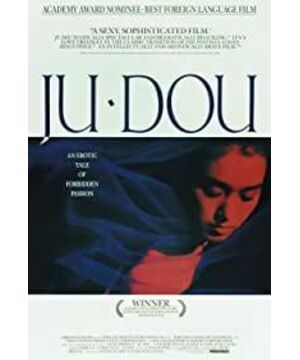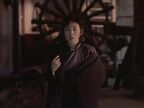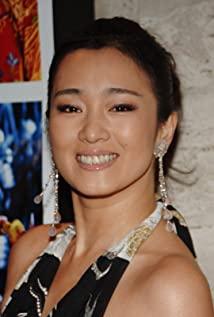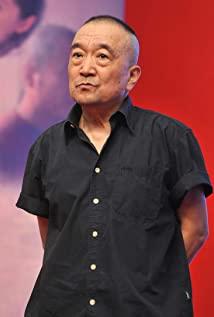From "Red Sorghum" to "Judou" to "Raise the Red Lantern", Gong Lijunxiu's appearance fits so well with the women she plays who are struggling with oppression and resistance. These three heroines are actually a "trinity". "They are all the shadows of Gong Li. Regardless of the theme content or the atmosphere of the picture, the three films present a trend of advancing layer by layer, sinking deeper and deeper in the dark vortex, and the tragedy becomes more and more intense. The shadows of Gong Li struggled in the distant and closed historical time and space. The specific time and space gave them a similar fate. They used their life passion to fight against the death and cruelty of fate.
In the high-pitched tone of "Red Sorghum", she died tragically. She died in a rain of bullets and dedicated her longing to her husband and children. She was happy and her struggle was victorious. In the dull tone of "Raise the Red Lantern", although she is alive, she is truly dead. She is crazy. Not only did she fail to resist, but she also lost herself in the end. She couldn't even choose to die. , This is the greatest tragedy. In the "Ju Dou" between the two, she burned herself to death in a poignant way. Her resistance failed. Her dream of happiness was shattered. Is she alive or dead? She chose to die. This was the way she gave herself. From then on, she got rid of the child forever.
Ju Dou's child, the child who once brought happiness, the child who was once placed with hope and the future, forced his parents into desperation in silence, turned into Ju Dou's pain, and became her lingering nightmare. . This child, his innocence has become his most terrible lethality. His innocence makes Judou and Tianqing sink into the quagmire of love and morality forever, accompanied by helpless struggle and endless hope.
Judou broke through all the barriers of ethics and morality. She was hungry and drank her exhilarating lust. From then on, she was alive again. Her enthusiasm made her love, and her love fulfilled her life. She created a child for their love. They looked at the child hopefully, eagerly looking forward to it, and happily looking forward to it, but she never thought that the child did not belong to her. The child is silent before he grows up, but once the silence is broken, he grows uncontrollably.
Tian Qing longed for the child to speak, and longed to hear a "daddy", but in the end it was the child who called his love's foe "father". When the child grows up, the morality of the world tells him that he is not the son of Azure, he refuses to be the son of Azure, he is no longer silent, and he resists in his own way. By the dyeing pool, the child coldly watched the adoptive father drown, when the water was cold blue. A few years later, still by the pool, the child coldly drowned his own father, Azure, when the water was tense red. At this time, Ju Dou could no longer stand it anymore. When Tian Qing was alive, the children dug a gap in their love. Now the gap has become a precipice. She cannot accept this child, this love for her. Child of creation. Ju Dou chose the last resistance. She wanted to get rid of the child completely. The scorching flame separated her from the child. She in the flames now has no passion. In the blood-red flame, her face was as gray as death, but she left a deep shock to the audience. I don't know what the children outside the fire felt when they saw this scene.
However, this child is also innocent. He came to the world because of love, and he also bears moral scars. He faces the world silently. Whether he hates or loves in his heart, outsiders never know or care, even if he loves him. Parents. His biological parents only care about their fiery love, only care about struggling to survive between love and morality, and only care about looking forward to the day when their children truly recognize their love and call Tianqing "father". The child has been silent all the time, but his eyes clearly see the secrets of this deep house compound. He knows that Tianqing is his father, and he also knows this is a shame, so he instinctively refuses. We can't blame the child. The child came into the world. What he yearns for is to blend into this world. His weak insight makes him long for a kind of "harmony" recognized by the universal morality.
The plot of the film is full of drama, and the film's setting, tone, and lens language are also dramatic. They are in the same line as Zhang Yimou's style. Zhang Yimou asked the family elders to solemnly interpret what is ethical authority on the stage like a ritual. He gave the ceremony a gray, staid, and dull tone, and used a panoramic lens to demonstrate the orthodoxy of ethics and morality. At the same time, this deep-rooted orthodoxy was used to suppress the love between Judou and Azure. From the birth of the child, to the child speaking, to the child witnessing the drowning of the adoptive father, and finally to the drowning of the child's father, all sudden dramas are centered on the child. These dramatic plots are all deliberately done, but this is Zhang Yimou's narrative method.
From "Red Sorghum" and "Judou" to "Raise the Red Lantern", Zhang Yimou uses his expressive set colors and lens language to tell what is true and false in an orientalist way. Oriental fables. In these films, perhaps Zhang Yimou's pursuit is not entirely realism. His imagination of the situation of women in that specific time and space and how to present this imagination in a desired and unique way may be his more focused pursuit. After all, movies are just fantasy of light and shadow, and they have infinite dimensions to express the world, but the reality is hard to reach, and even movies with copying functions may not be able to do it. The oriental fables and strong orientalism are Zhang Yimou's way of choosing to express the world, and what he shows is the reality he imagined. Whether the audience likes it or not, this is the way he chooses to behave, and this is his movie.
At this point, we can no longer say that Judou's child is just a child. It is better to say that he is a child of feudal ethics than Judou's child, or that he is a gift from the screenwriter and director to Tianqing and Judou. But when Tianqing and Judou opened the present expectantly, they found a bottle of arsenic inside. Judou's child is a symbol, a symbol, and a destiny that Judou cannot escape. The child has no say in the film. His only voice is the "daddy" that makes Ju Dou worry. His silence is not only the helpless and innocent situation of this little man in the adult world, but also the deliberateness of the directors on him. arrange. The choreographer silenced the children, and at the same time allowed ethics to stand between Judou and Tianqing in the image of a child.
At the funeral of the adoptive father, the child became the embodiment of ethics. He sat on the coffin blankly, watching his biological parents, Tianqing and Judou, being forced to cry in mourning over and over again under the ethical rules, coldly. Watching them ravaged in the funeral procession. There is an infinite distance between a child and his parents. He was born out of love. When he came to this world, he lived in lovelessness. That historical time and space is cruel. It is cruelly stifling natural emotions. The directors are cruel. They are cruel to make the audience watch the children become the embodiment of ethical shackles.
Everyone has a predicament in every age. The predicament of Judou and Tianqing is the ethics of that era, and it is their children; the predicament of the child is his birthplace, Judou and Tianqing; and how Zhang Yimou’s predicament expresses them The dilemma is the movie itself.
View more about Ju Dou reviews










